仁爱科普版(2024)Unit 5 Love Mother Nature!语法 冠词与情态动词(can和can't)课件 (共19张PPT)科普版英语七年级上册
文档属性
| 名称 | 仁爱科普版(2024)Unit 5 Love Mother Nature!语法 冠词与情态动词(can和can't)课件 (共19张PPT)科普版英语七年级上册 |  | |
| 格式 | pptx | ||
| 文件大小 | 2.1MB | ||
| 资源类型 | 教案 | ||
| 版本资源 | 仁爱科普版 | ||
| 科目 | 英语 | ||
| 更新时间 | 2024-10-11 16:04:05 | ||
图片预览

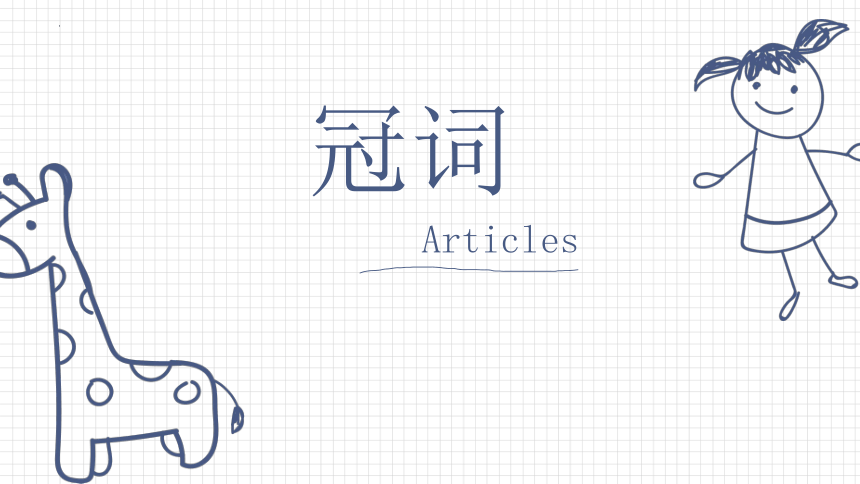
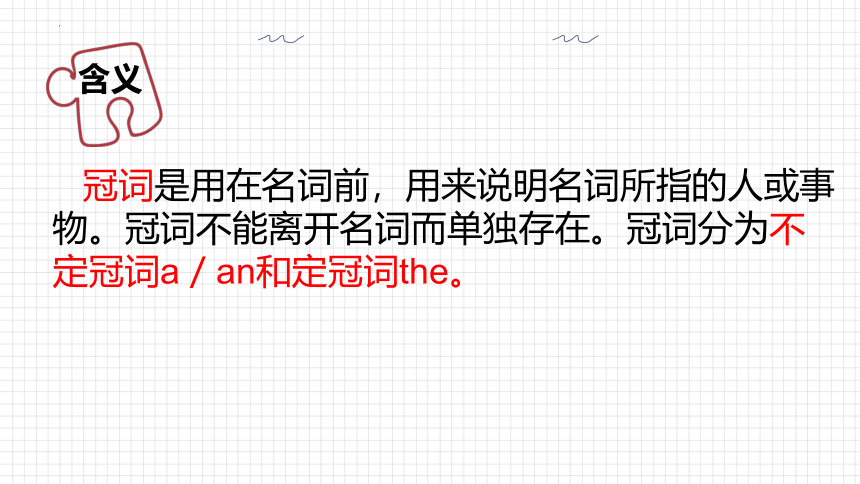
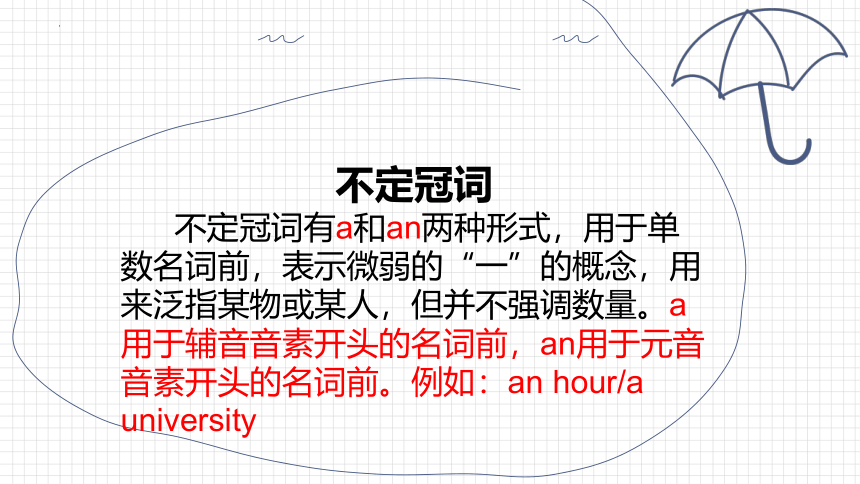
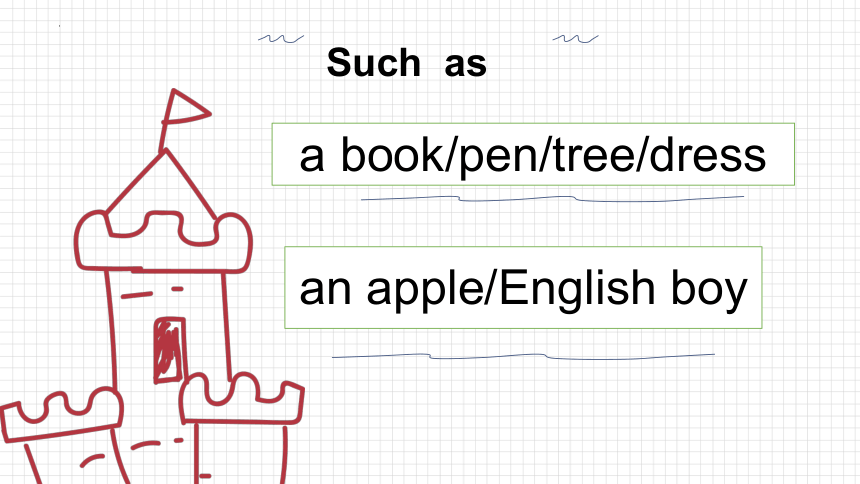
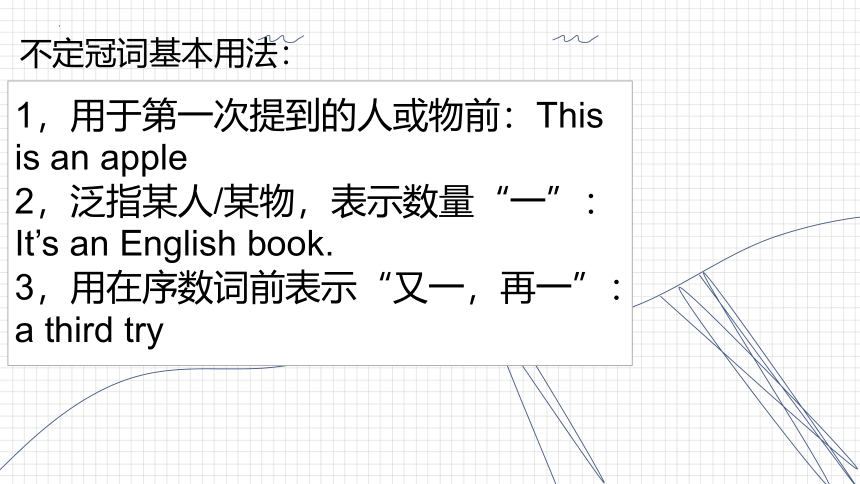
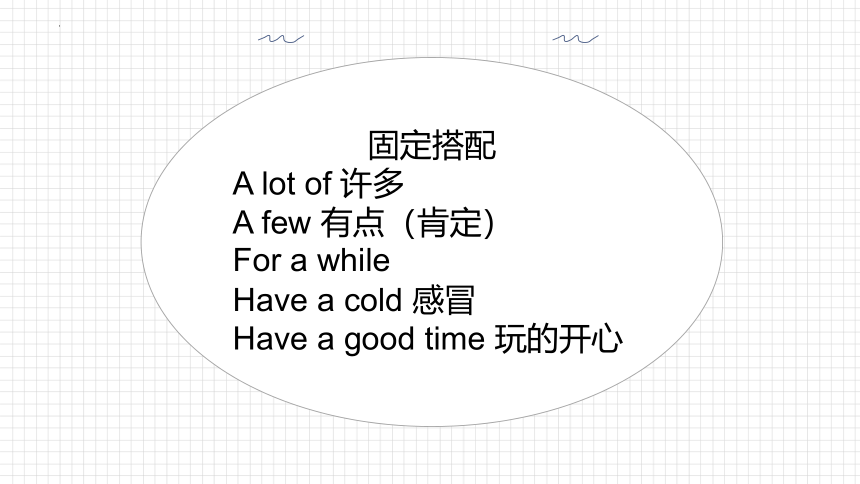
文档简介
(共19张PPT)
冠词与情态动词
冠词
Articles
冠词是用在名词前,用来说明名词所指的人或事物。冠词不能离开名词而单独存在。冠词分为不定冠词a/an和定冠词the。
含义
不定冠词
不定冠词有a和an两种形式,用于单数名词前,表示微弱的“一”的概念,用来泛指某物或某人,但并不强调数量。a用于辅音音素开头的名词前,an用于元音音素开头的名词前。例如:an hour/a university
Such as
a book/pen/tree/dress
an apple/English boy
不定冠词基本用法:
1,用于第一次提到的人或物前:This is an apple
2,泛指某人/某物,表示数量“一”:It’s an English book.
3,用在序数词前表示“又一,再一”:a third try
固定搭配
A lot of 许多
A few 有点(肯定)
For a while
Have a cold 感冒
Have a good time 玩的开心
定冠词the用法
1,指上文已经提到的人或事物
2,特指某人或某物:The boy under the tree is Tom
3,用在序数词/最高级前:the first time / the best
4,用在形容词前,表示一类人:The young should respect the old
5,用在独一无二的事物前:the sun / the moon / the sky
6,用在姓氏复数前表示一家人:the Greens
7,用在弹奏乐器前:play the piano/violin
定冠词固定搭配
at the same time 同时
at the age of 在…岁时
by the way 顺便一提
1,I have a bird. bird is white.
2, Where are keys They are on table.
3, horse is a useful animal.
4, He can play piano.
5, January is first month of the year. The book is best of all.
.
零冠词
即名词前不加冠词
1,球类/棋类名词前:play basketball / chess
2,与by连用的交通工具前:by bike/ bus
3,人名/地名/国家名
4,星期/月份/季节/一日三餐
5,学科/语言/某国人
6,名词前已有物主代词/指示代词修饰
固定搭配:
at once 立刻,马上
day and night 日日夜夜
1.( )Hangzhou held 19th Asian Games in 2023.
A.a B.an
C.the D./
2.( )There are 60 minutes in hour.
A.a B.an
C.the D./
3.( )China is country with a history of more than 5,000 years.
A.the B.a
C.an D./
4.( )The C919 is large plane made by China.
A.a B.an
C.the D./
5.( )My mother is making apple pie,and I want to try piece.
A.a;an B.a;/
C.an;a D.an;/
can是英语中常见的情态动词,can't是can not的缩写形式。can与can't无人称和数的变化,后加动词原形。
情态动词(Modal Verb) can/can't
情态动词can肯定形式、否定形式的用法如下表:
肯定形式 否定形式
I can do... I can't do...
You can do... You can't do...
She/He/It can do... She/He/It can't do...
We/You/They can do... We/You/They can't do...
can的疑问形式及简略答语如下表:
疑问形式 简略答语
肯定形式 否定形式
Can I do... Yes,you can. No,you can't.
Can you do... Yes,I can. No,I can't.
Can he/she/it do... Yes,he/she/it can. No,he/she/it can't.
Can you/we/ they do... Yes,we/you/ they can. No,we/you/they can't.
形式 意义 例句
can 表达能力 I can swim.我会游泳。
表示可能性和推测 It can get very hot in the summer.
夏天可能会变得很热。
表达请求和征求意见 Can I ask you a question
我可以问你个问题吗?
表达许可和允许 You can go now.
你可以走了。
can't 表示无法(能力)或不被允许做
She can't come to the party because she has other plans.
她不能来参加聚会,因为她已有其他安排。
表示否定推断(一定不是、不可能发生或不存在) That can't be Jim in the classroom. He's at home now.教室里那人不可能是吉姆。他现在在家。
表示拒绝或不接受
I can't buy you that book.
我不可能给你买那样的书。
1.( )-I find my keys.-Have you checked your jacket pockets
A.mustn't B.shouldn't
C.can't D.wouldn't
2.( )-Would you like to visit Tianjin University tomorrow
-Sorry,I'm afraid I .I'll work as a volunteer in my community.
A.can B.can't
C.must D.mustn't
3.( ) -Is that Jim running on the playground -It be him.He is always in the library at this time.
A.mustn't B.shouldn't
C.can't D.needn't
4.( ) I take photos here
-Sorry,you can't. It's not allowed in
the museum.
A.Must B.Need
C.Can D.Will
5.( )-Can you speak English,Lingling -Yes,I .
A.must B.can
C.should D.will
谢谢观看
THANKS
冠词与情态动词
冠词
Articles
冠词是用在名词前,用来说明名词所指的人或事物。冠词不能离开名词而单独存在。冠词分为不定冠词a/an和定冠词the。
含义
不定冠词
不定冠词有a和an两种形式,用于单数名词前,表示微弱的“一”的概念,用来泛指某物或某人,但并不强调数量。a用于辅音音素开头的名词前,an用于元音音素开头的名词前。例如:an hour/a university
Such as
a book/pen/tree/dress
an apple/English boy
不定冠词基本用法:
1,用于第一次提到的人或物前:This is an apple
2,泛指某人/某物,表示数量“一”:It’s an English book.
3,用在序数词前表示“又一,再一”:a third try
固定搭配
A lot of 许多
A few 有点(肯定)
For a while
Have a cold 感冒
Have a good time 玩的开心
定冠词the用法
1,指上文已经提到的人或事物
2,特指某人或某物:The boy under the tree is Tom
3,用在序数词/最高级前:the first time / the best
4,用在形容词前,表示一类人:The young should respect the old
5,用在独一无二的事物前:the sun / the moon / the sky
6,用在姓氏复数前表示一家人:the Greens
7,用在弹奏乐器前:play the piano/violin
定冠词固定搭配
at the same time 同时
at the age of 在…岁时
by the way 顺便一提
1,I have a bird. bird is white.
2, Where are keys They are on table.
3, horse is a useful animal.
4, He can play piano.
5, January is first month of the year. The book is best of all.
.
零冠词
即名词前不加冠词
1,球类/棋类名词前:play basketball / chess
2,与by连用的交通工具前:by bike/ bus
3,人名/地名/国家名
4,星期/月份/季节/一日三餐
5,学科/语言/某国人
6,名词前已有物主代词/指示代词修饰
固定搭配:
at once 立刻,马上
day and night 日日夜夜
1.( )Hangzhou held 19th Asian Games in 2023.
A.a B.an
C.the D./
2.( )There are 60 minutes in hour.
A.a B.an
C.the D./
3.( )China is country with a history of more than 5,000 years.
A.the B.a
C.an D./
4.( )The C919 is large plane made by China.
A.a B.an
C.the D./
5.( )My mother is making apple pie,and I want to try piece.
A.a;an B.a;/
C.an;a D.an;/
can是英语中常见的情态动词,can't是can not的缩写形式。can与can't无人称和数的变化,后加动词原形。
情态动词(Modal Verb) can/can't
情态动词can肯定形式、否定形式的用法如下表:
肯定形式 否定形式
I can do... I can't do...
You can do... You can't do...
She/He/It can do... She/He/It can't do...
We/You/They can do... We/You/They can't do...
can的疑问形式及简略答语如下表:
疑问形式 简略答语
肯定形式 否定形式
Can I do... Yes,you can. No,you can't.
Can you do... Yes,I can. No,I can't.
Can he/she/it do... Yes,he/she/it can. No,he/she/it can't.
Can you/we/ they do... Yes,we/you/ they can. No,we/you/they can't.
形式 意义 例句
can 表达能力 I can swim.我会游泳。
表示可能性和推测 It can get very hot in the summer.
夏天可能会变得很热。
表达请求和征求意见 Can I ask you a question
我可以问你个问题吗?
表达许可和允许 You can go now.
你可以走了。
can't 表示无法(能力)或不被允许做
She can't come to the party because she has other plans.
她不能来参加聚会,因为她已有其他安排。
表示否定推断(一定不是、不可能发生或不存在) That can't be Jim in the classroom. He's at home now.教室里那人不可能是吉姆。他现在在家。
表示拒绝或不接受
I can't buy you that book.
我不可能给你买那样的书。
1.( )-I find my keys.-Have you checked your jacket pockets
A.mustn't B.shouldn't
C.can't D.wouldn't
2.( )-Would you like to visit Tianjin University tomorrow
-Sorry,I'm afraid I .I'll work as a volunteer in my community.
A.can B.can't
C.must D.mustn't
3.( ) -Is that Jim running on the playground -It be him.He is always in the library at this time.
A.mustn't B.shouldn't
C.can't D.needn't
4.( ) I take photos here
-Sorry,you can't. It's not allowed in
the museum.
A.Must B.Need
C.Can D.Will
5.( )-Can you speak English,Lingling -Yes,I .
A.must B.can
C.should D.will
谢谢观看
THANKS
同课章节目录
